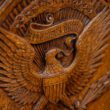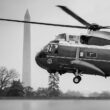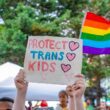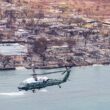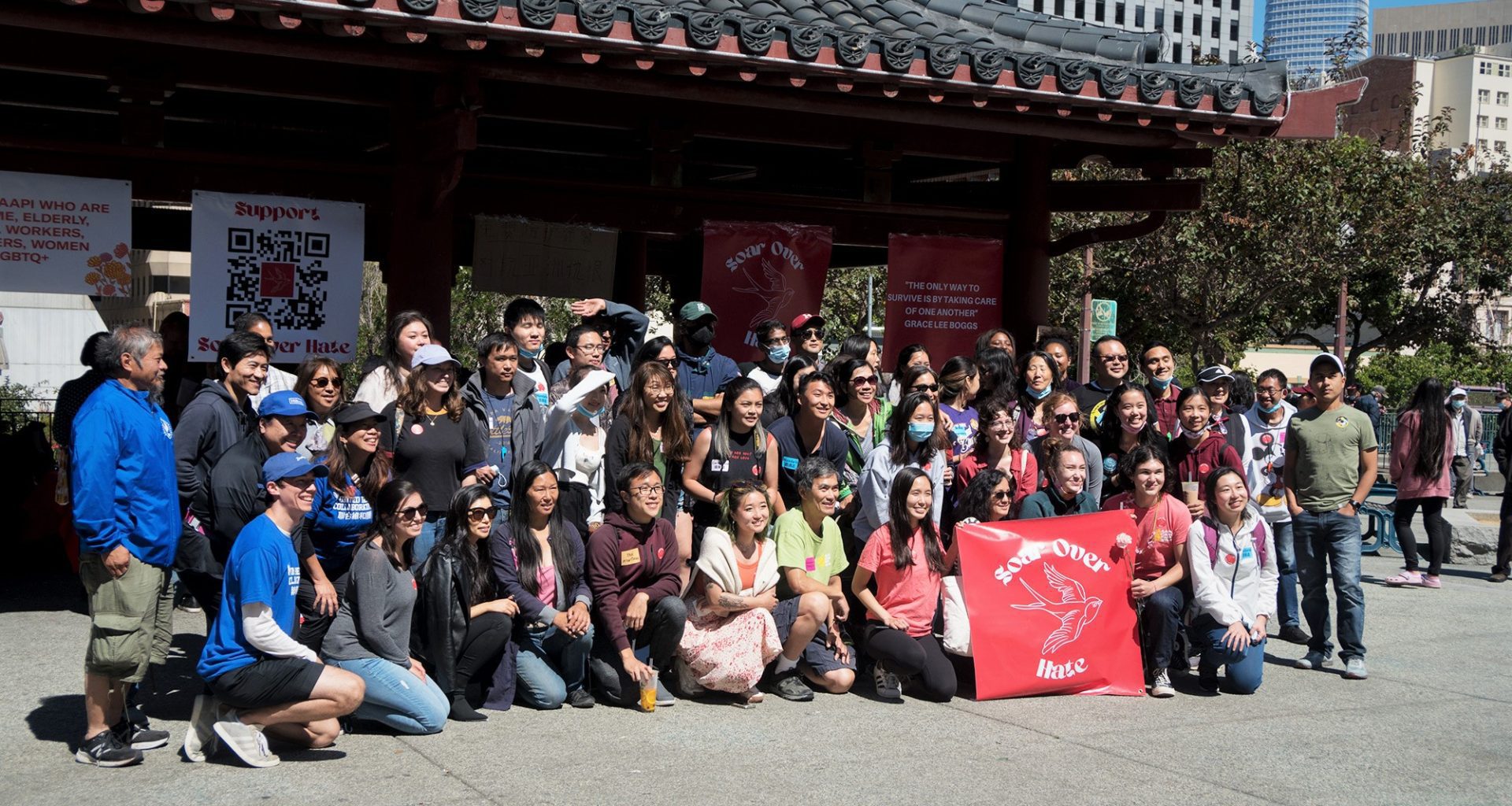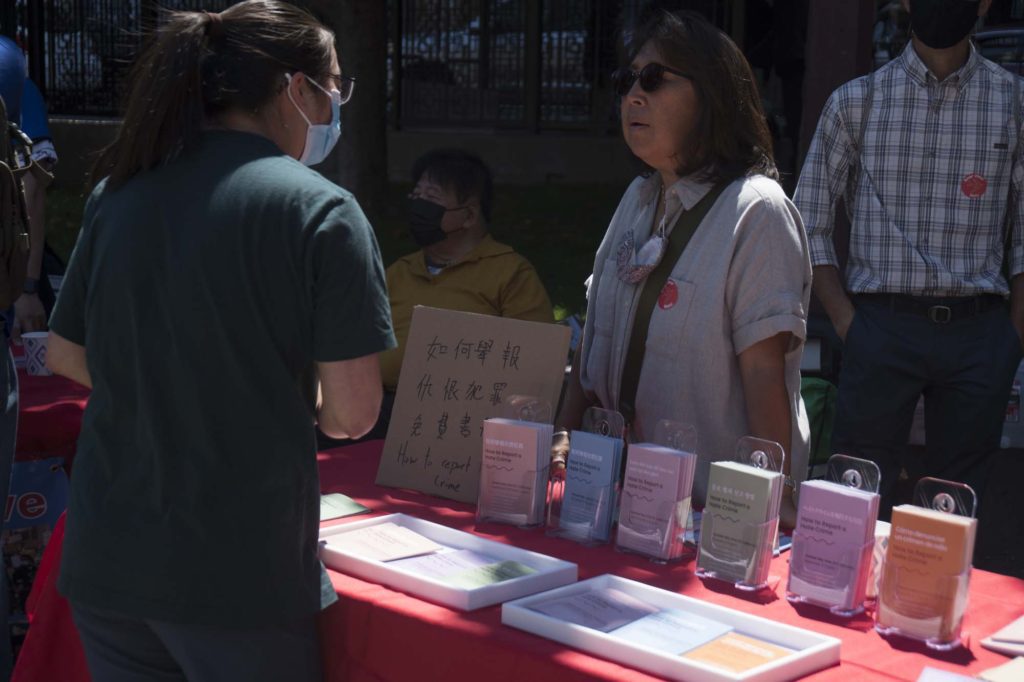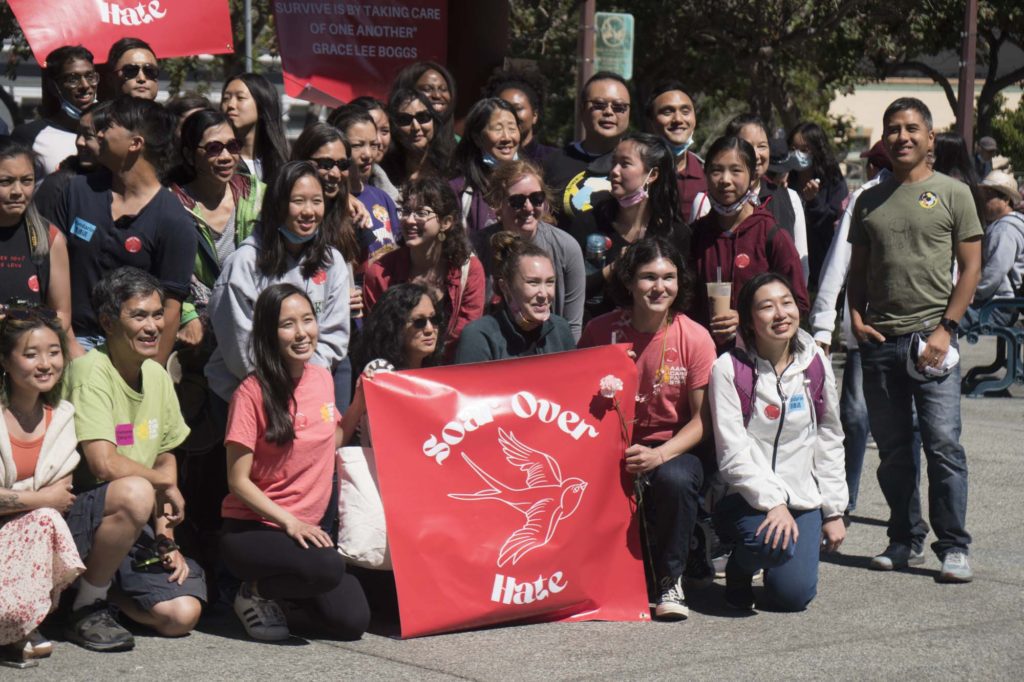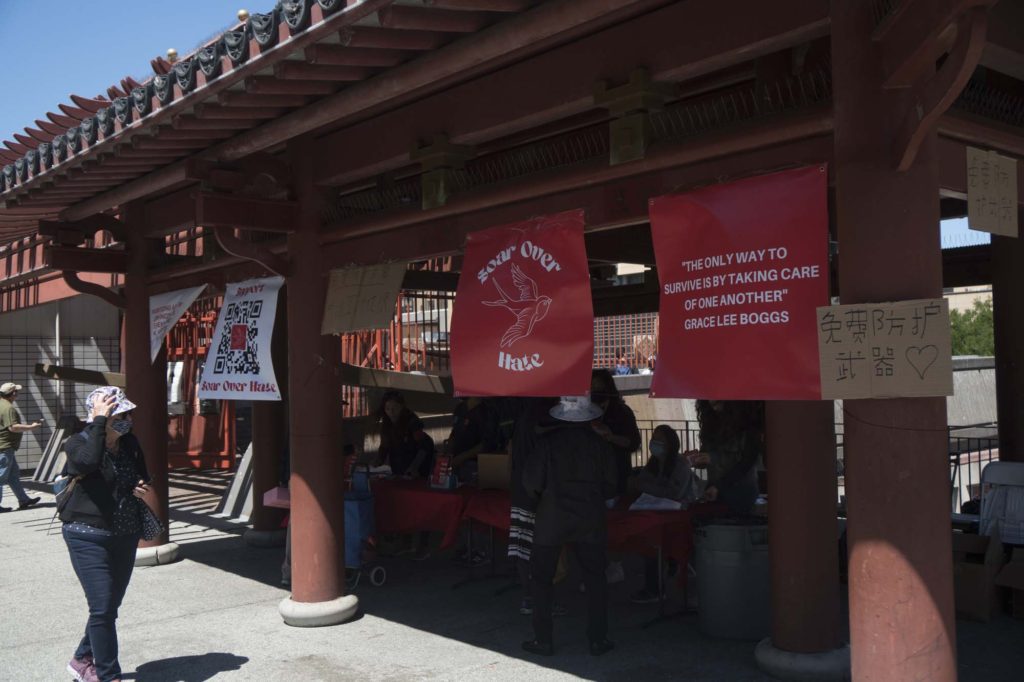Sign up here to receive The Yappie‘s weekly briefing on Asian American + Pacific Islander politics and support our work by making a donation.
Portsmouth Square, a small park tucked against the eastern edge of San Francisco’s Chinatown, is typically host to groups of Chinatown elders as they play card games on sunny afternoons.
On a recent Saturday afternoon, the park was even more lively than usual. Dozens of volunteers and organizers joined the regulars in booths along the park walkways.
People who walked into the square were offered personal safety devices. Members of the self-defense instruction and activism group Asians Are Strong demonstrated basic techniques in front of a crowd of onlookers. Volunteers wearing red stickers handed out leaflets on how to report hate crimes, while Michele Ku, a teacher at the East Bay Meditation Center, led guided meditation and journaling sessions.
The event I had walked into was the second AAPI Care Fair hosted by Soar Over Hate, an organization that “aims to protect Asians Americans from hate crimes by equipping them with personal safety devices and other services.” The group’s first event in San Francisco brought together 10 community organizations—their work ranged from community patrol to youth engagement.
Soar Over Hate first attracted media attention for distributing thousands of personal safety alarms and pepper spray to residents in New York City’s Manhattan and Flushing Chinatowns in April. A month later, the organization hosted its first Care Fair in Columbus Park, with over 2,000 attendees and 130 volunteers. At the event, the Asian American Legal Defense and Education Fund helped attendees register to vote. The Asian Pacific American Medical Student Association also provided free health screenings.
Michelle Tran and Kenji Jones founded Soar Over Hate in April this year. Alarmed by the rise in anti-Asian hate, the two had each started their own initiatives distributing personal safety equipment to vulnerable NYC communities, Jones told me.
“I started on Instagram and was lucky enough to raise $18,000 within a week,” Jones said. Tran also raised a significant $14,000 with an earlier iteration of Soar Over Hate.
“Along the way, Michelle and I became linked up through Instagram,” Jones said. “We realized that we could partner up and use both of our resources and connections to make something greater.”
The support would later enable them to expand beyond personal safety equipment.
Partnerships formed amid hate
Several Bay Area organizations started following the spike in anti-Asian violence in the early months of 2020. Through Care Fair, they found ways to pool resources and support the community together. Army veteran Leanna Louie and her partner Robert Lowe, founded United Peace Collaborative (UPC) in March last year after former President Donald Trump began using racist terms like “Chinese virus” and “Wuhan virus.”
Initially, Louie and Lowe were joined by two other veterans. As time went on, UPC attracted attention online, and with it came the cavalry. The group started training people, eventually recruiting more than 80 volunteers.
Roughly 30 of these volunteers patrol local neighborhoods on a regular basis, working shifts to provide daily coverage. UPC also started painting over graffiti and providing legal aid for victims of crime, among other things.
Chinatown Safety Patrol, another patrol organization, was founded a year later in February after Vicha Ratanapakdee, a 84-year-old Thai man, died from an assault outside his San Francisco home.
“That was so brazen and out in the open, it sent alarm bells [ringing],” founder Anthony Su told me. Unlike UPC, which has more experienced patrol members operating in groups of one or two, Chinatown Safety Patrol organizes groups of at least three to four people each night. From a 150-person email list, around 10 people typically show up each night, Su said, coming from as close as Chinatown and as far as Daly City, Walnut Creek, or Palo Alto, in Su’s case.
“In terms of immediate needs, patrol is necessary. But in the long term, we can’t only rely on patrol … We need our generation to come back,” said Jonathan Sit, the COO of Revive SF Chinatown and a Chinatown Safety Patrol member. “Talking to some store owners and restaurant owners, they’re saying it’s kind of tough to sustain a business sometimes because they need people to work for them, but the people that work for them are mostly middle-aged.”
That’s why, shortly after the formation of Chinatown Safety Patrol, some members started Revive SF Chinatown with three objectives: bridging generations, building community, and supporting local businesses.
Each Friday, Revive organizes a group meal at a local restaurant, connecting different community members and investing hundreds of dollars in local establishments. They make it a point to share pictures from these gatherings on Instagram with the hashtag #ChinatownFridays. The meals also encourage attendees to reconnect with languages they might speak or hear at home.
“Our presence alone is a deterrent for any violence around here,” Sit said.
It helps that AAPI activism has become more visible in the past year, said Jones. “We’ve heard from so many people, so many volunteers and attendees, that they felt inspired to action recently more than ever,” they told me.
A new legacy
These collaborations have ushered in a new era of community-building, engaging both new and old circles of engagement.
Su and other members of Chinatown Safety Patrol originally knew each other from campaigning for Andrew Yang’s 2020 presidential run, but stayed in touch after the election. Other volunteers like Siyi Song, a Chinese international student, found opportunities to get involved online. Song read about Soar Over Hate in the news before signing up to volunteer.
Jones and Tran are themselves part of this new wave of activists. As students living in New York City, both had been politically active, but leading Soar Over Hate was the first time they were inspired to pursue large-scale organizing.
“The fact that something like this … had to happen to encourage people to be more [politically] active—that it took violent hate crimes against their community to inspire people to put in work for their community—I guess it’s bittersweet,” Jones said. “We were both part of the Asian American community [in New York City], but now we feel so much more integrated, just being in Chinatown every week.”
In both New York and San Francisco, Soar Over Hate has further strengthened collaboration on an inter-organization level. “Building partnerships and building community and connections between other organizations feels super special and something that we hope to do more in the future,” Jones told me.
Soar Over Hate returned to New York City after the San Francisco Care Fair, launching a $3,000 scholarship program for AAPI students and planning more events in Brooklyn’s growing Chinatown. There’s plenty of work to do, no matter where they go, Jones said.
“Previously a lot of Asian Americans would push off responsibility for their community to other people, to the government, to people in politics,” Jones said “We’re [now] taking personal responsibility for the wellbeing of our community, which is super important because if we’re in the mindset that someone else is going to make the change, then no change happens.”
The late Chinese American activist Grace Lee Boggs said it best. That Saturday afternoon, her words were splayed across a large red banner: “The only way to survive is by taking care of one another.”





